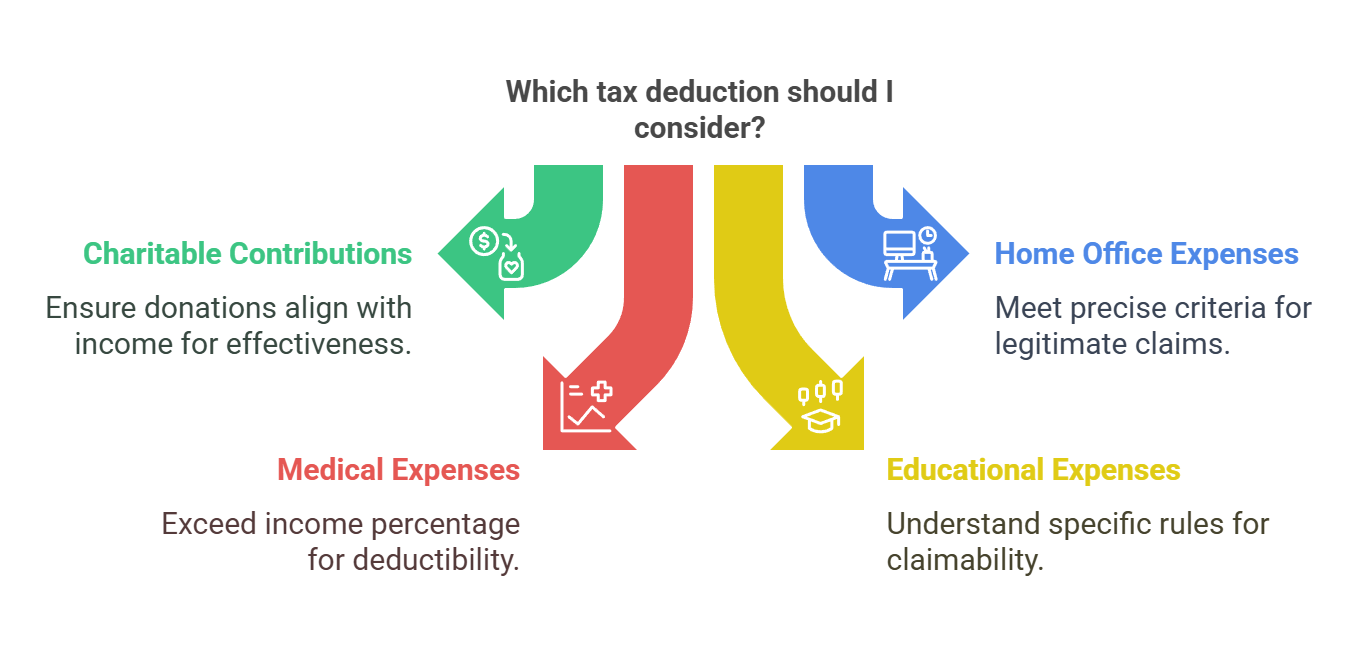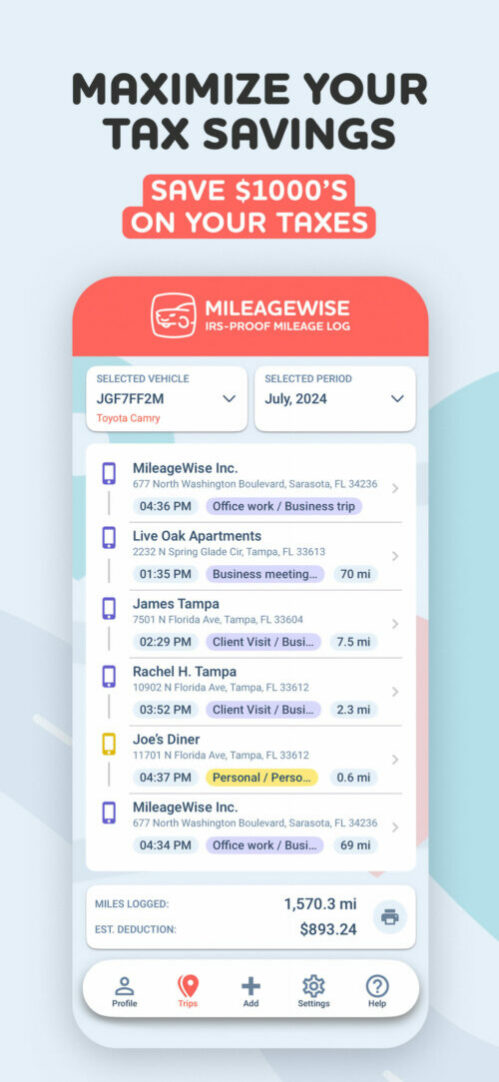Common IRS audit triggers include unreported income, claiming large deductions compared to your income, and reporting high self-employment income or expenses. Other red flags that may trigger an IRS audit are taking the home office deduction, running a cash-based business, dealing with cryptocurrency or foreign accounts, and making noticeable errors or inconsistencies on your tax return.
In this article, we’ll explore key IRS audit triggers and how MileageWise plays a vital role in ensuring IRS compliance, particularly in mileage logging. We’ll also provide comprehensive FAQ sections for certain topics and a best practices section to address your doubts and enquires.

Try MileageWise for free for 14 days. No credit card required!
Dashboard
1. Reporting Accurate Taxable Income To Avoid IRS Audit Triggers
Accurately reporting all taxable income is fundamental. Both the IRS and taxpayers receive W-2 and 1099 forms, so any discrepancies can easily trigger an irs audit. It’s essential to report all income, regardless of whether you receive these forms or not.
Why Report Every Penny?
- Accuracy Equals Less Anxiety: Accurate income reporting keeps the IRS at bay, reducing the likelihood of audits.
- Transparency is Key: It showcases your commitment to transparency, building a trustworthy foundation with tax authorities.
Common Income Sources to Report
- Wages and Salaries: The basics, but sometimes overlooked in their entirety.
- Freelance Income: Every gig counts, no matter how small.
- Investment Returns: From dividends to interest, all must be declared.
- Rental Income: The profits from property leasing aren’t exempt.
- Foreign Income: Often missed, always required.
FAQs to Keep You Informed
- Q: Do I report income to IRS that’s not documented on a 1099 or W-2? A: Absolutely. All income, documented or not, must be reported.
- Q: What if I make a mistake and forget to report something? A: Amend your return as soon as possible to correct any oversight.
Engage with Transparency
Adopting a meticulous approach to reporting all income types not only minimizes audit risk but also empowers you with the confidence that you’re fully compliant with zero audit triggers. Remember, when in doubt, report—it’s always better to be safe than sorry in the realm of taxes.
2. Navigating the Landscape of Deductions: Finding the Right Balance
When it comes to deductions, striking the perfect balance between claiming mileage on taxes that are rightfully yours and avoiding the IRS spotlight is an art. Let’s explore how to claim deductions wisely, ensuring you stay clear of audit triggers.
- Claim with Confidence: Know which deductions you’re entitled to—don’t leave money on the table.
- Keep it Realistic: Ensure deductions are proportional to your income to avoid red flags.
Deductions Worth Watching
- Charitable Contributions: Generosity is great, but keep your donations in line with your income.
- Home Office Expenses: A legitimate deduction for many, but precise criteria must be met.
- Medical Expenses: Deductible, yet they must exceed a certain percentage of your income.
- Educational Expenses: Can be claimed, but specifics vary—know the rules.

FAQs
- Q: How do I know if a deduction is too large? A: Compare your deductions to your income and industry norms. If it stands out, so will you.
- Q: Can I deduct expenses from a hobby as business expenses? A: Only if the hobby earns income and the expenses are directly related.
Charitable Donations
Large charitable donations, especially when disproportionate to income, can raise red flags. Ensure all donations are properly substantiated, including obtaining appraisals for significant noncash donations and filing necessary forms like Form 8283 for donations over $500.
3. Business Expenses and Meals
Deducting and tracking business expenses, particularly meals with clients, must be done carefully. Only legitimate business-related expenses should be claimed, and it’s crucial to keep detailed records, including receipts and the business purpose of each expense.
4. Personal Use of Business Vehicles
Using business vehicles for personal errands can trigger an audit. Maintain a detailed log of mileage for business use. This is where MileageWise can be invaluable. Our tool offers you automatic trip classification and ensures that your mileage logs are accurate and IRS-Proof, protecting you from potential audits.
5. Home Office Deductions
Claiming a home office deduction is permissible for independent contractors, but the space must be used exclusively for business. Be cautious awoid these IRS audit triggers and only claim this deduction if you meet the strict criteria.
6. Accurate Reporting of All Income Types
This includes unreported income such as interest, dividends, and nonemployee compensation. Ensuring that all forms of income are reported can prevent unwanted attention from the IRS auditors.
7. Rental Income and Deductions
Accuracy in reporting rental property income and deductions is essential. Showing a loss despite high rental rates can prompt an audit. Consult with a tax advisor to ensure you’re compliant.
8. Cryptocurrency and Day Trading Activities
The IRS is paying closer attention to cryptocurrency transactions and day trading activities. Ensure all transactions are substantiated and consult a tax advisor if you’re engaged in these activities.
9. Foreign Bank Accounts
Properly report any foreign bank accounts to avoid triggering an IRS audit. The failure to accurately report these accounts can lead to serious scrutiny.
Key Insights for Reporting Foreign Accounts
- Be Proactive: Understand the requirements for reporting foreign bank accounts, including the FBAR and FATCA.
- Accurate Reporting: Ensure all foreign income and account details are accurately disclosed.
Common Questions and Answers
- Q: When do I need to report foreign bank accounts? A: If the total value of your foreign accounts exceeds $10,000 at any time during the calendar year, you must file an FBAR.
- Q: What penalties might I face for non-compliance? A: Penalties can be severe, including hefty fines and criminal charges in extreme cases.
10. Early Retirement Withdrawals and Rounding Numbers
Be cautious with early retirement withdrawals, as they often attract penalties and IRS attention. Also, avoid rounding numbers on your tax returns; exact figures are less likely to trigger an audit.
General Best Practices to Avoid IRS Audit Triggers

Claiming Tax Credits Wisely: Your Guide to Maximizing Benefits
Tax credits can be a taxpayer’s best friend, offering a dollar-for-dollar reduction in your tax bill. But, navigating the maze of eligibility and documentation can be tricky. Here’s how to make the most of your tax credits, without inviting undue attention from the IRS.
Smart Strategies for Tax Credit Success
- Know Your Eligibility: Understand which credits you qualify for—education, energy efficiency, or child care, to name a few.
- Documentation is Key: Keep meticulous records to substantiate your claim.
Popular Tax Credits and Common Pitfalls
- Earned Income Tax Credit (EITC): Vital for low- to moderate-income workers but ensure your income levels are accurately reported.
- Child and Dependent Care Credit: A boon for parents, yet precise expenses must be documented.
- Education Credits: Offers relief for students and families, but only legitimate educational expenses count.
FAQs for Navigating Tax Credits
- Q: What if I mistakenly claim a tax credit? A: Correct the error by filing an amended return as soon as possible to avoid penalties.
- Q: How do I prove eligibility for a tax credit? A: Keep detailed records of expenses, receipts, and any relevant documentation to support your claim.
Embracing Tax Credits with Confidence By understanding the rules and maintaining proper documentation, you can confidently claim the tax credits you deserve, optimizing your tax return while staying within the bounds of the law. Remember, when in doubt, seeking advice from a tax professional can provide clarity and peace of mind.
Distinguishing Between Business and Personal Expenses
Blurring the lines between business and personal expenses can be a red flag for the IRS, especially when hobbies or personal activities are involved. Here’s how to navigate these waters safely and effectively.
Key Considerations for Business vs. Personal Expenses
- Clear Separation: Always keep personal and business finances distinct.
- Document Purpose: For every expense, document how it relates to your business.
Common Areas of Confusion
- Home Office Deductions: Claim this only for dedicated workspaces.
- Travel and Meals: Only business-related expenses are deductible.
- Vehicle Use: Distinguish between business and personal mileage.
FAQs to Guide You
- Q: Can I deduct expenses for a hobby? A: Expenses can be deductible if the hobby generates income, but they’re scrutinized closely.
- Q: What if my business and personal expenses overlap? A: Allocate expenses proportionally and document the business use meticulously.
Staying on the Right Side of the Line
Understanding the distinction between personal and business expenses—and documenting each meticulously—can help you claim what’s rightfully yours without stepping over the line. When in doubt, consult a tax professional to ensure your deductions are legitimate and well-supported.
Handling Income Fluctuations: A Guide to Audit-Proof Reporting
Significant swings in income can send up red flags to the IRS risking an audit, but with the right approach, you can navigate these changes smoothly. Here’s how to manage income fluctuations and maintain compliance.
Strategies for Reporting Income Fluctuations
- Maintain Detailed Records: Keep comprehensive documentation of your income sources and any factors leading to fluctuations.
- Transparent Communication: Consider attaching a brief explanation with your tax return if your income has significantly changed.
FAQs for Smooth Sailing
- Q: How do income fluctuations affect my tax return? A: Large swings may prompt the IRS to look closer, ensuring all income is reported correctly.
- Q: What if my income drops significantly? A: Document the reasons for the decrease, such as market conditions or business restructuring.
Stay on Top of Your Mileage Tracking
Staying informed about IRS audit triggers and maintaining meticulous records is key to avoiding audits. For those who use their vehicle for business, MileageWise offers a robust solution to keep your mileage logs accurate and compliant. Our mileage tracker not only simplifies the mileage logging process but also ensures that your records are detailed and IRS-Proof, giving you peace of mind and more time to focus on your business.
Level Up Your Mileage Tracking
MileageWise: Tracks trips automatically via vehicle movement, Bluetooth, and Plug’N’Go without draining your battery.
AI-Powered Mileage Recovery: The AI Wizard helps reconstruct past mileage logs, filling gaps in your log to ensure compliance.
Built-in IRS Auditor: Checks and corrects up to 70 logical errors in logs, ensuring they meet IRS standards for tax deductions.
Web Dashboard & Team Collaboration: Manage logs, import trips, and collaborate with teams through the web dashboard, ideal for businesses.
Try it for free for 14 days. No credit card required!









